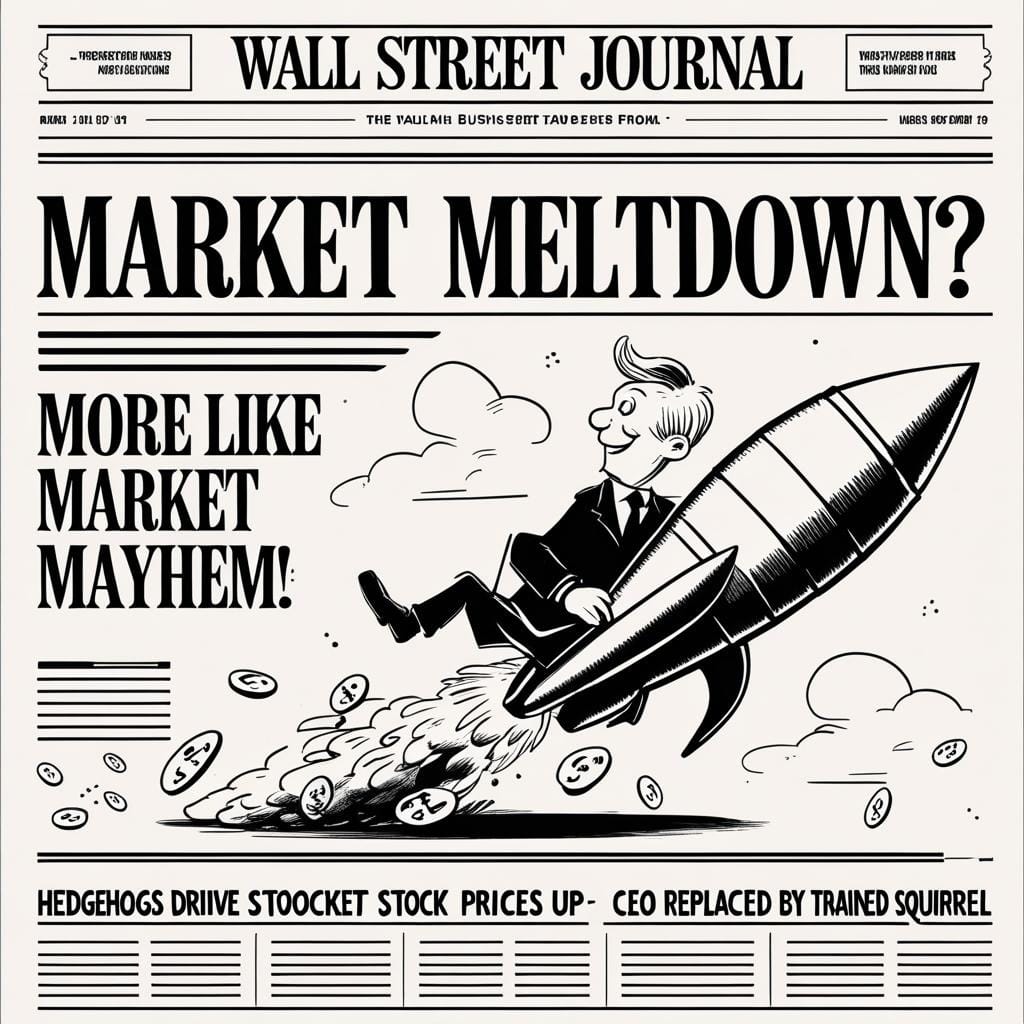Trump vs. The Wall Street Journal: When the Spectacle Eats Its Own

President Trump filed a $10 billion libel lawsuit against the Wall Street Journal on Friday after the paper published a story about an alleged 2003 birthday card to Jeffrey Epstein featuring Trump's signature and "a drawing of a naked woman."
Trump personally called Rupert Murdoch before publication, telling him the letter was "a scam" and threatening to sue if they ran it. They ran it anyway. Now we get to watch Trump sue his own media ally while everyone pretends this is about journalism instead of what it actually is: political theater with very high stakes.
The Letter That Launched a Thousand Subpoenas
According to the WSJ, the letter contains "several lines of typewritten text framed by the outline of a naked woman" with Trump's signature positioned "below her waist, mimicking pubic hair." The message allegedly ends with "may every day be another wonderful secret."
Trump denied writing it, telling the Journal: "I never wrote a picture in my life. I don't draw pictures of women. It's not my language. It's not my words." Basic question everyone should ask themselves: if you're the sitting President of the United States, and a major newspaper is about to publish something this explosive that you know is fake, wouldn't you provide some actual proof it's fake instead of just saying "trust me bro"?
But here's the thing that's very funny: at least four of Trump's drawings were sold at auction during his first administration. So the "I don't draw pictures" defense feels a bit... incomplete.
When Allies Turn Into Enemies
The Trump-Murdoch relationship has always been transactional. Murdoch owns Fox News (Trump-friendly) and the Wall Street Journal (occasionally Trump-skeptical), which lets him play both sides depending on what's profitable. One executive who has worked with Murdoch said "Rupert loves to poke the president in the eye once in a while."
Now Trump is threatening to make Murdoch testify under oath in depositions, which honestly might be the most entertaining thing to come out of this whole mess. Two billionaires who've spent decades manipulating media narratives having to answer questions under penalty of perjury? Sign me up.
But let's not pretend this is some principled stand by the WSJ. Multiple Journal staffers called publishing the story despite Trump's threats a "brave" act, which... sure, if your bar for bravery is "doing basic journalism when the subject calls your boss."
The Legal Reality Nobody Wants to Discuss
Here's what won't make it into most coverage: for Trump to win this defamation case as a public figure, he needs to prove not just that the claims are false, but that the Journal acted with "actual malice" - meaning they knew it was false or acted with reckless disregard for the truth.
That's an incredibly high bar. Even if the letter turns out to be fake, Trump has to prove the Journal knew it was fake when they published it. Given that the letter was reportedly part of documents examined by Justice Department officials who investigated Epstein and Maxwell, the Journal has a pretty solid "we relied on government sources" defense.
Legal experts told CNN they couldn't recall any sitting president ever suing a news outlet over a story. Which makes sense - when you have the presidential bully pulpit, you usually don't need to file lawsuits to defend yourself. Unless, of course, the goal isn't actually winning in court.
The Convenient Timing of Everything
Let's zoom out for a second. This story breaks just as Trump's base is pressuring his administration to release more Epstein files, and right after Trump's Justice Department had to file a motion to unseal grand jury transcripts in the Epstein case.
The Trump administration spent weeks getting hammered for not releasing everything about Epstein, so now suddenly we're all talking about whether Trump sent a dirty birthday card in 2003. Very convenient how the conversation shifted from "what is the current president hiding about Epstein" to "did he draw boobs on a birthday card 22 years ago."
And Trump chose to file the lawsuit in the Southern District of Florida, where a jury might be more receptive to his claims than in New York where News Corp is based. Because apparently even when you're righteously defending your honor, you still want home field advantage.
Questions Everyone Should Be Asking
Here are the obvious questions that somehow aren't getting asked enough:
- If this letter is fake, who made it and why? And how did it end up in government evidence files?
- Why is a sitting president spending time and political capital on a decades-old birthday card instead of focusing on, you know, running the country?
- What happens when Trump inevitably loses this lawsuit and has to pay the WSJ's legal fees?
- Is anyone else noticing how every scandal gets buried under the next scandal, and we never actually get answers to anything?
The WSJ story includes contributions from billionaire Leslie Wexner and attorney Alan Dershowitz to the same birthday album. But somehow we're only talking about Trump's alleged contribution. Why aren't we asking what Wexner and Dershowitz wrote? Why isn't anyone demanding to see the whole album?
The Real Story
This isn't about a birthday card or journalistic ethics or even defamation law. This is about power, spectacle, and distraction. Trump gets to play the victim of fake news while moving the conversation away from current Epstein file controversies. The WSJ gets to look tough and independent while still maintaining their relationship with Murdoch's broader empire. And we all get to argue about drawings of naked women instead of asking harder questions about what happened to the Epstein investigation.
As one media executive put it: Trump and Murdoch "scratch each other's backs, despite the scar tissue that has built up over the years." This lawsuit won't change that fundamental dynamic. In six months, they'll probably be having dinner at Mar-a-Lago while we're all distracted by whatever crisis comes next.
Meanwhile, the actual Epstein victims are still waiting for justice, and we're all arguing about birthday cards from 2003. Trump's base believes "the government is covering up Epstein's ties to the rich and powerful," but somehow filing a lawsuit against a newspaper is supposed to demonstrate transparency?



Comments ()